Dashnor Kaloçi
Memorie.al/ Published some archival documents taken from the Central State Archive in Tirana (fund of the former Central Committee of the ALP), where the political diary of Enver Hoxha in the period March-May 1981, when the demonstrations and protests began of the people of Kosovo, who rose up to demand their legitimate rights and freedoms, just as the other nationalities and nations that made up the Federal Republic of Yugoslavia had and enjoyed them. The entire political diary of the main leader of communist Albania, where he and the official Tirana of that time, closely followed the events in Kosovo and spoke openly in public, coming out openly in defense of our Kosovar brothers across the border who lived for centuries in the lands ethnic groups, who rose up to demand their legitimate rights and freedoms as the other nationalities and nations of Yugoslavia at the time had and enjoyed, and accusing official Belgrade of the discriminatory policies pursued by the Titoist regime until at that time against Kosovo and the entire Albanian population living under Yugoslavia, and also accusing the Kosovo leadership of being “pro-Tito”, and “sold to the Belgrade leadership”. But contrary to what he said in words, he never did it with deeds and the attitude that official Tirana held towards the events of Kosovo in the spring of ’81, seems to have been just enough for the facade and only for public consumption in the international arena, as the regime Enver Hoxha’s communist regime from 1949, when official Tirana broke off relations with Marshal Tito’s Yugoslavia, until the end of the 1980s, pursued a policy towards Kosovars who came to Albania to escape the persecution of the Titoist regime. even more cruel to them, imprisoning, torturing and interning them, with the accusations of “UDB agents”!
“We must also make an analysis of the attitudes held by the various chancelleries, that is, to determine and recognize which ambassadors of the countries of the world, especially of the countries of Europe and in particular of those countries that have or that could have influence over the Yugoslav government, have been pro-us, against the actions of the Yugoslavs and have condemned them. Here let us not forget that there are also those who have been shown to be neutral. So far, we have seen that some newspapers have written more realistically in favor of the issue of the people of Kosovo and our position. Such are some newspapers and journalists of the Federal Republic of Germany, ie the West Germans, then come the Austrians. We do not even have diplomatic relations with West Germany, while relations with Austria are good. The Austrians hold this position because they have contradictions on minority issues with the Yugoslavs, while the West Germans do not. “Therefore, we have to judge why West Germany has a more realistic attitude towards Kosovo Albanians and towards Albania, which has always criticized it and is in disagreement with it.”
This is what the former main leader of communist Albania, Enver Hoxha, wrote in his diary of May 18, 1981, focusing on the events in Kosovo, which at that time was the Autonomous Province of the Federal Republic of Yugoslavia, where just a few months after the death of Marshal Josof Broz Tito (May 4, 1980), who ruled the country for almost 35 years from the end of World War II, in the Yugoslavia he left behind, internal unrest would begin. , such as the mass demonstrations and protests of the people of Kosovo who rose up to demand their legitimate rights and freedoms, just as the other nationalities and nations that made up the Federal Republic of Yugoslavia had and enjoyed, to go as far as calls “Kosovo Republic”.
As we will see from these archival documents where the political diary of Enver Hoxha is located, the main leader of communist Albania and official Tirana, followed closely the events of Kosovo and spoke publicly, coming out openly in defense of our Kosovar brothers. across the border living for centuries in their ethnic lands and accusing official Belgrade of the discriminatory policy it had pursued until then towards Kosovo and the entire Albanian population living under Yugoslavia, and also accusing the Kosovo leadership of being “pro-Titoist”. “, And” sold to the leadership of Belgrade “.
But contrary to what he said in words, he never did it with deeds and the attitude that official Tirana held towards the events of Kosovo in the spring of ’81, seems to have been just enough for the facade and only for public consumption in the international arena, as the regime Enver Hoxha’s communist regime from 1949, when he broke off relations with Marshal Tito’s Yugoslavia, until the late 1980s, pursued an even more savage against them, imprisoning, torturing and deporting them, with the accusations of “UDB agents”!
Likewise, although in the events of the spring of 1981 and onwards, official Tirana ostensibly supported the demonstrations of the people of Kosovo and their demands for a “Kosovo Republic”, Enver Hoxha would never want that to become a reality. because in a way, two Albanian states would be created, where Kosovo would become a factor and Albania under his leadership, would be defactorized in the international arena. In this context, immediately after those events, official Tirana intensified the persecution and violence against Kosovars who were in Albania, arresting and sentencing to prison some Kosovar intellectuals, such as: Selim Kelmendi, Estref Kelmendi, Shefqet Kelmendi, Naimk Lucin, etc., who were arrested in 1983, accused of: “attempting to assassinate the main leader of the Party, during his visit to the Museum” Gjergj Kastrioti Skënderbeu “in Kruja in 1980”.
And all this was done to lower the reputation of Kosovars and Kosovo in the eyes of the Albanians of the homeland. However, these remain the object of analysis that are not the subject of this article, where we are publishing only the political diary of Enver Hoxha, which he has kept in that period of time, which Memorie.al since March of this year, continues to publish in full in some issues of the historical dossier section.
Enver Hoxha’s political diary on the events of demonstrations and protests of the people of Kosovo in the spring of 1981
WEDNESDAY 13 MAY 1981
MEETING OF THE POLITICAL BUREAU FOR EVENTS IN KOSOVO AGAIN
This afternoon I convened an extraordinary meeting of the Politburo, where I presented the third article on recent events in Kosovo. The friends, after reading the article, fully agreed with it and approved it unanimously.
SATURDAY 16 MAY 1981
THE REQUEST TO RECOGNIZE KOSOVO THE STATUS OF THE REPUBLIC IS RIGHT
I read once again the article entitled “The request to recognize Kosovo as a republic is right”. In this article we analyze politically and historically the reactionary attitude and without any basis of the various Yugoslav leaders to the events in Kosovo and the just demand of Kosovars for the declaration of Kosovo as a republic. In fact, although these days they have talked constantly about this issue, none of them has explained why Kosovo cannot be a republic. The article will be published tomorrow.
THURSDAY 21 MAY 1981
SOVEREIGNIST AND OBSCURANT ACTION BY SERBOMEDDENE TOWARDS CULTURAL RELATIONS WITH KOSOVO
I talked to Ramiz for a group of our professors, who have given lectures at the University of Prishtina, and a group of friends of the Albanian Television to write a special article where they refute the accusations of the Yugoslav Serbs against the work they have done in Kosovo… Our professors and professors point out that all their lectures have had a scientific character and content. Holding such lectures, papers and lectures has been very necessary and a working practice between scientific institutions and no longer between Albania and Kosovo.
Let’s talk about the successes of education and culture in Kosovo, about the ability, ingenuity and cultural horizon of Kosovar students and professors, which has been noticed in the symposia and in the academic discussions that have taken place in Albania, in Kosovo and elsewhere, where they are. distinguished Kosovar scholars. In other words, our professors say that the work they have done in Kosovo has had only a scientific character and not a political one. The Yugoslavs call him a “nationalist”, we’ll let the Soviet, American and British “scientists” then give “non-nationalist” lectures. Kosovar students and professors have judged our activity and its value. This is our pleasure.
We only emphasize that the decision taken by the Yugoslav government in this matter, by brutally severing these ties, is an action that does not happen anywhere in the civilized world. It is clear that this is done to leave Kosovar youth in the dark. This is a futile attempt at chauvinism and obscurantism. Television comrades should also defend the good work done by their representatives in Kosovo and Kosovars in our country. There was no malicious intent, no “subversive” intent in this work. There was only a desire for Albanian cultural development from both sides, a great confirmation of patriotism, of songs, dances, of our common folklore.
We have sung to our people, our common heroes, we have shown our common feelings and we have never offended the feelings of the peoples of Yugoslavia. This development, this cooperation, approved by the Yugoslav government, they call incitement for “nationalism, chauvinism, irredentism”. It cannot be said more clearly that Serbia does not want Kosovo to develop its education and culture, but wants to Serbize it with the stories of Milan, Dusan, Brankovic and forget Skanderbeg, the heroes of the Albanian League of Prizren, Bajram Currin, Isa Boletini and others. For Serbian chauvinists, singing the story of these is a crime, it is “sick romanticism”, it is “remembering ghosts”.
All these absurd slanders should be rejected by the people of our Television, good words should be spoken about the talented Kosovar singers and dancers, who should continue and develop the tradition, as we are doing. It should be noted that the Albanian Television will not break the signed protocols, but will continue and expand the endowed programs. Such an offensive should be made by our prominent people of different genres of literature, art, culture, theater. To keep this issue constantly raised, not only as a controversy, but on the high platform of art and culture. This work should be done in addition to the lectures and lectures that our professors and professors would hold at the University of Prishtina, to be given, as I have recommended, through special shows of the Albanian Radio-Television.
FRIDAY 22 MAY 1981
WE MUST WORK FOR THE INTERNATIONAL PUBLIC OPINION TO BE IN FAVOR OF THE KOSOVO ISSUE
We are noticing that Cé d’Orsejai is generally not showing kindness to our cause and is currently not taking an impartial stance. On the contrary, it is favoring Yugoslavia. This is not in our interest. But in France we have friends like Robert Eskarpiti, who speak with great sympathy and publicly about Albania. It is known that such important personalities as Robert Eskarpiti, as well as writers, publicists, well-known professors have their circle. Therefore, our Ministry of Foreign Affairs, in the first place, must think about how to work with these friendly personalities in favor of our cause. Now that Mitterrand has come to power in France, there will surely be major changes in government as well.
The Minister of Foreign Affairs of France, for example, could be Jober, who, as far as I know, when he was once in this post, in the time of Pierre Mesmer, pursued a policy with anti-American nuances and precisely for therefore he resigned and fled. So, I have the impression that then Jobber withdrew, why it was not for a very ostensibly pro-American policy, but for a more pronounced political independence of France from the United States. In this regard and for this issue, our Ministry of Foreign Affairs should give information to our ambassador in Paris, to instruct him how to talk and what to talk about, what connections he should maintain with different personalities.
This is not about ready-made and written recipes, to give a dinner or lunch, but how and what should be explained to these people about the problems and political attitudes of the Albanian Government on general policy issues and international events. or the concrete issues of our foreign policy. That is, these people see and understand our political attitudes and actions as they are, right, reasonable and principled and not the consequences of a policy of passions, as some want to present it. Take, for example, the events in Kosovo. They should be talked about not just to inform and convince them of the fairness of the attitudes we have taken, but, given each other’s circle and opportunities to influence others in their favor. to expose our political views to them and this exposure that will be made to them, to have the spirit of a conversation as between colleagues and friends.
This job is of great importance to us. We must not let the spread and echo of our political views remain only in the hands of the journalistic opinion, of this or that journalist, of this or that current, but we must process this opinion and strengthen its conviction about justice. of our policy. We, therefore, must keep in mind one thing: outside opinion is not created without orientations. It is a lie to say that the press there is free and democratic. In bourgeois democracy it is free and democratic to some extent, that in essence it is oriented and manipulated by someone and not by someone in general, but by someone in the concrete sense. In bourgeois democracy there are interests of financial and monopolistic groups.
Both the press and the general policy of the bourgeois governments are confirmed and subjected to these interests, and as a result the journalistic opinion conforms to and serves the general policy of the government of its own country. We must not forget this. Therefore, in this direction we must work and work seriously and not walk, as the Frenchman says, “d la lettre and d la drivel”, to say our word, without letting it go out, we do not need anything further! Not like this. We must not only say our word, but we must also work for it to take place in public opinion, to process it so that it understands us correctly and supports us. Currently there are events in Kosovo and related to them the issue of Yugoslavia itself. We have followed and must follow with special attention the echo, the impressions they create in journalistic circles in the world and especially in Europe.
Given the fact that these counties represent the opinion of the governments of their countries, in the form I pointed out above, we must distinguish which newspaper, which press has been shown most in our favor, of our just cause, namely the just cause of the people of Kosovo and the views we have expressed in support of our Kosovar brothers and their demands. We must also make an analysis of the attitudes held by the various chancelleries, namely to determine and recognize which ambassadors of the countries of the world, especially of the countries of Europe and in particular of those countries that have or can to have influence over the Yugoslav government, have been pro-us, against the actions of the Yugoslavs and condemned them.
Here let us not forget that there are also those who have been shown to be neutral. So far, we have seen that some newspapers have written more realistically in favor of the issue of the people of Kosovo and our position. Such are some newspapers and journalists of the Federal Republic of Germany, ie the West Germans, then come the Austrians. We do not even have diplomatic relations with West Germany, while relations with Austria are good. The Austrians hold this position because they have contradictions on minority issues with the Yugoslavs, while the West Germans do not. We must therefore judge why West Germany has a more realistic attitude towards Kosovo Albanians and towards Albania, which has always criticized and disagreed with it.
So, I think that for the issue of Kosovo we should be interested in those who are interested, regardless of the reason they leave, for it to be resolved favorably, that is, we should give them some signals to work in the direction that interests us. I have reached this opinion and I say that one should think and find the appropriate case, moment and form, how to present and how to deal with this issue. Maybe we should wait a little longer, as we did with the first two articles, for our latest article to do its job, to see the reaction of world opinion, whether it will be for or against us, it will be cool, lukewarm or hot. Let’s wait for the Yugoslav reaction. Therefore, we can reach a conclusion.
What I said about the Federal Republic of Germany, for example, I said based on the reactions to the first two articles there. Now let’s look at what other reactions there will be after the last article. But last night I read an article that was very good and it seems to me that it was written in such a way, to let it be understood as if the author of the article was expressing his thoughts and had not read our article. But I became convinced that he had read it and that for certain purposes he did not mention it. This is a diplomatic maneuver. We, therefore, need to understand these things and not walk around casually. Thus, once we have reached the correct conclusions about these favorable attitudes, we need to find out which of our ambassadors has, for example, ties to West Germans.
Everyone has a connection with them, but especially a more concrete connection, it seems to me, is our ambassador in Vienna, where, as we know, the issue of compensation is also addressed. We in our last article, stating that there is only one people of a German nation, gave a gentle signal to the government of the Federal Republic of Germany and saw that this was immediately noted there. Namely, in West Germany we created, as it seems, a benevolent atmosphere towards our country, which could have political consequences not only in defending our current cause against the Yugoslavs, but also in the matter of reparations. Then, as the Frenchman decemmentt says, our ambassador, in a casual meeting he may have with the German ambassador, opens the matter to him without passion, but saying roughly: We have found that your press has kindly written about the matter. of Kosovo and our position on it, and, although we do not have such good relations with you, we have regarded this as a realistic judgment of the West German press.
It may not be so, our ambassador continues, but I have concluded that, despite the disagreements we have between us, the Bonn government also thinks realistically about this issue and sees that the actions of the Yugoslavs are very wrong, and it does. not for our sake, but for the general interest of peace in Europe. We, for our part, have so far expressed our views on these events and the attitude of the Yugoslavs in three articles. And to continue: Despite the disagreements, relations and talks between us have always been friendly, so I speak to you openly and, if you wish, Mr. Ambassador, I can give you our last article. But, please, read it very carefully and reason realistically about the real intentions of our Government.
There we defend our Kosovar brothers who are in the majority, we defend the Yugoslav Federation, we also defend peace in Europe. The Yugoslav leadership does not want to see this as such. In the article we also give the ways and means how the request of the people of Kosovo should be solved and who should solve it. Kosovo cannot be calmed down, as the Yugoslav government thinks. On the contrary, if some measures are not taken, it will become a dangerous gangrene. We openly say that the Serbian leadership does not want to find the right way of solution and this will cause great damage to the Yugoslav Federation itself, which we do not want. Therefore, someone else has to intervene here. Read our article and you will see that we make differentiations there.
For example, we understood Mr. Dolanc when he spoke for the first time and rightly said that we had not participated in the events in Kosovo. He was sure of what he said then. At the same time, it made us realize that we should not talk. We, our ambassador goes on to say, understood this and did not speak. But Dolanc was not understood by his comrades. They launched fierce and constant attacks against us, so we were forced to respond to them. After all these things that happen, in the last article we again say that we know how to judge calmly and make differentiations and we are making these differentiations. We think that for the current events and for the just request of the people of Kosovo, one should reflect calmly, that they should be resolved correctly, that the people of Kosovo should be given the rights they demand, and this in the right way. The Serbian leadership does not want to do this. As a result, things will get worse.
Thus, we do not tell the German ambassador directly that the Bonn government or anyone else should intervene. I, to say our ambassador, speak to you as a colleague, because, as I told you, I find that West Germany is looking at these problems correctly. We think that the issue should be resolved as Kosovars demand. We openly declare that we will protect the rights of Kosovars, which someone denies and oppresses. With insults, slogans and demonstrations of force, with the closure of the university, with false trials, it is known why they are done, by whom and for what purposes, this issue is not resolved. But there must be people in Yugoslavia who have authority, and they must use that authority for the good of the Yugoslav Federation. We have said this honestly and we neither speak, nor are we two-faced. We tell the truth openly, lo and behold, as I am speaking to you now, although, as I told you at the beginning, we do not have such a good relationship with you, but I do it because for these problems on your part I see a logic of right and in the interest of peace in Europe.
We also pay close attention to Chancellor Schmid’s stance on general policy between the Soviet Union and the United States. Why hide this. That is why we are telling you, and you should know, that we are on the right path and there is no one to shake us from this path. We are not afraid of anyone, not even the Yugoslavs. When we say that we do not want the Federation to be dissolved, Kosovars do not want that either, and, we believe, neither do you. The German ambassador can say to our ambassador: Why are you saying these things to me? – I tell you, – our ambassador answers, – to clarify our position and, I repeat, I say to an ambassador, with whom I had talks about problems that are still unresolved, although we are right about them, why do I see your press looking at this issue with kindness. – What can I do? – maybe the German will say it again. “I do not know,” replied our friend. – Only as a representative of Albania, I am telling you some issues, I am re-emphasizing them, because in order to say them, the article of our newspaper has said and laid out well. / Memorie.al
Continues in the next issue





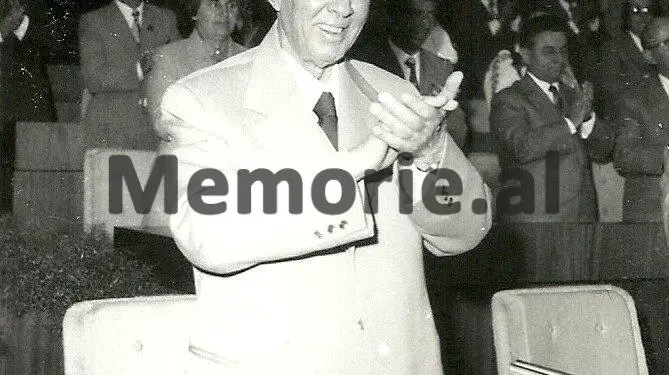
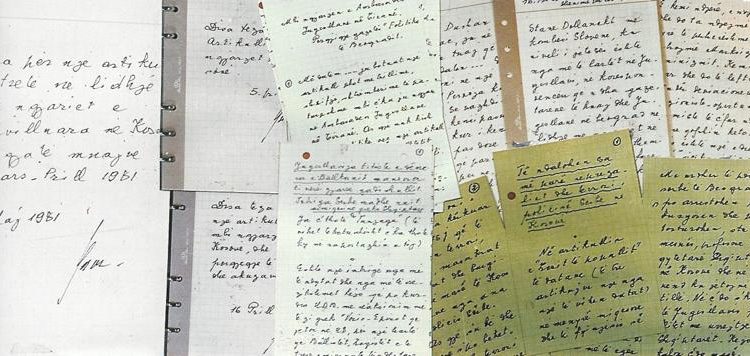
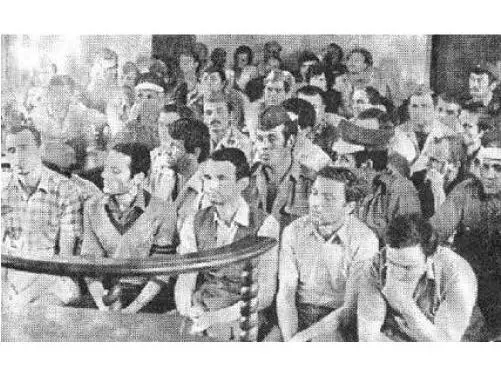
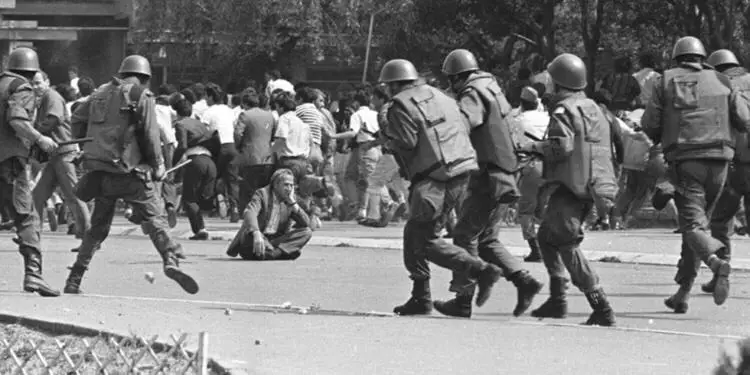
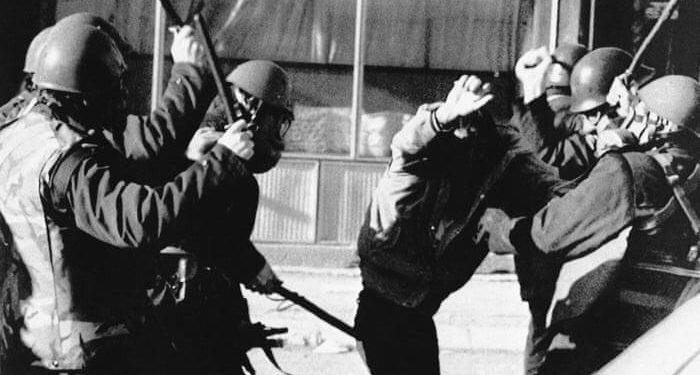
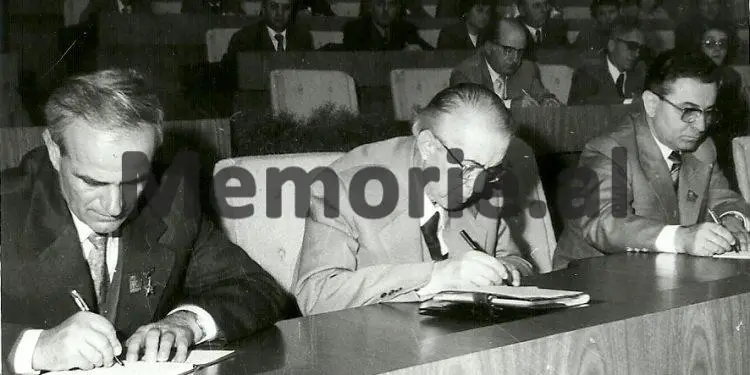
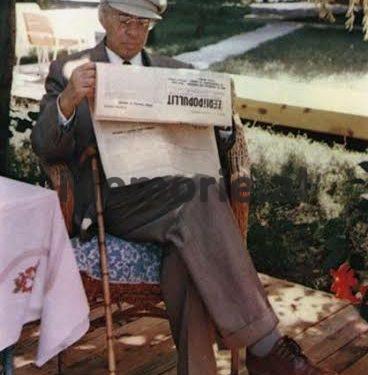
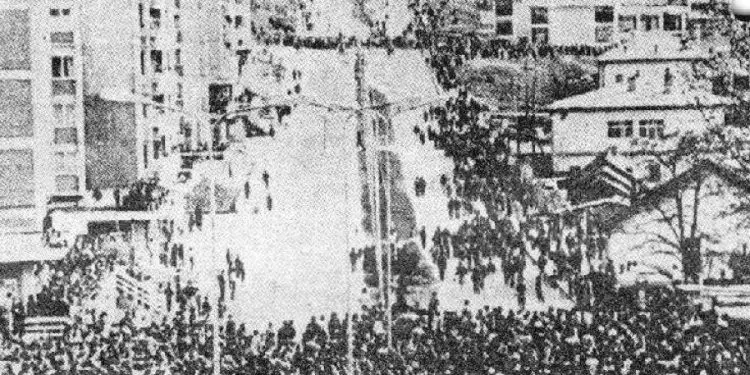

![“In an attempt to rescue one another, 10 workers were poisoned, but besides the brigadier, [another] 6 also died…”/ The secret document of June 11, 1979, is revealed, regarding the deaths of 6 employees at the Metallurgy Plant.](https://memorie.al/wp-content/uploads/2026/02/maxresdefault-350x250.jpg)





